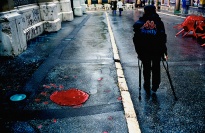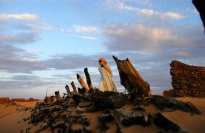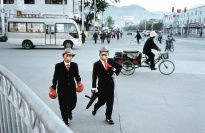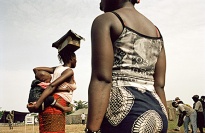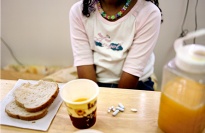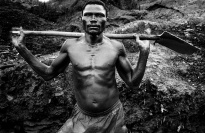About Moving Walls 11
With photographs from four continents, the eleventh exhibition of Moving Walls captures the breadth of the Open Society Foundations' mission. At the same time, the show’s focus on Africa reflects the Foundations' growing commitment to supporting open society in a region associated by many with only war, poverty, and AIDS. By exploring the issues around resource wealth, ethnic cleansing and displacement, and the transition from conflict to peace, the photographs seek to give visual meaning to some of the underlying reasons for the challenges many countries in Africa face.
In Liberia, as the end of a brutal dictatorship has brought new hope for stability in West Africa, it has also raised questions about how to ensure democracy in a country ravaged by decades of violence. Tim Hetherington’s photographs, which document the dismantling of Charles Taylor’s regime, provide a unique perspective. Though the media often portray Liberia as a place of mindless chaos and faceless victims, Hetherington’s work reveals the personal lives that are irrevocably changed by the events of war.
To the east, the Sudanese province of Darfur has become synonymous with ethnic cleansing. Lynsey Addario shows the desperate conditions of Darfurian refugees, who have been forced from their homes in a campaign of state-sponsored violence with seemingly no end in sight. Peace also remains elusive in the Democratic Republic of Congo, where the West’s desire for minerals and gems continues to fuel conflict over control of natural resources. By exploring the lives of miners and their surrounding community in resource-rich eastern Congo, Marcus Bleasdale offers a stark depiction of mining’s devastating consequences.
Sara Terry turns to Bosnia to look at how society rebuilds itself in the aftermath of conflict, a story that often goes untold. Taken after nearly a decade of formal peace, her photographs show Bosnians working to overcome the legacies of a crippling war and return to normal life. Julien Chatelin explores the question of cultural identity in a place free from violence—Lhasa, the capital of Tibet—but where a half-century of Chinese occupation has diluted the traditional way of life. Signs of Tibetan culture are inconspicuous or else exploited for tourism in Chatelin’s portrait of a city trapped in China’s stranglehold.
Though some in the United States now consider AIDS a foreign blight, Katja Heinemann challenges this view by showing how the disease has affected American children living with HIV. Infected through blood transfusions or from the first wave of HIV-positive mothers, many are left to deal with the physical and psychological burdens of their illness in isolation from their peers.
